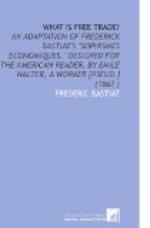I, and his friends owned a fine fleet of merchantmen when the war broke out. The aggregate burden of the vessels was nearly a million of tons, and they were worth $40 a ton. When the rebel cruisers commenced their operations, there were no United States cruisers prepared to capture them, because our best vessels were on blockade service. This being the case, insurance on American merchantmen rose very high—so high that I and his friends were reluctantly compelled to sell their vessels in Great Britain and elsewhere, and convert them into cash. They brought $40,000,000, and this sum was invested in merchandise, which netted a profit of ten per cent. to I and his friends. They thus gained $4,000,000 by these transactions. The entire proceeds, $44,000,000, they then lent to the government with which to carry on its war of existence with the Southern insurgents. Profitable as these transactions clearly were to I and his friends, and to the government, Mr. Greeley, nevertheless, only sees the import of $40,000,000 worth of foreign extravagances, and consequently wants the tariff on iron increased in order to make water run up hill.
J, had $2,000,000 in five-twenty bonds, which cost him $1,400,000 gold. As the market price in New York was only 70 gold, while it was 72-1/4 in London, he conceived the inhuman idea of selling them in the latter place. The cost of sending them there, including insurance, &c., made them net him but 72, but at this price he gained a profit of $40,000. With his capital now augmented to $1,440,000 he bought rags in Italy, which he sold in New York for $1,584,000, ex duty and plus transportation, a clear profit of $184,000 from the start. No export appearing in the Commerce and Navigation Returns, and nothing but the rags meeting his unital gaze, Mr. Greeley at once posted his national ledger with a loss of $1,440,000, the cost of the rags in Italy.
K, was, and is still (for these are actual transactions taken from his account books), an exchange broker, doing business in New York. He buys notes on the banks of England, Ireland, Scotland, France and Canada—indeed, foreign banknotes of all kinds—for which he usually pays about ninety per cent, of their face value. By the end of last year he had invested $200,000 in these notes brought here by travellers. He then inclosed them in letters, and sent them to their proper destinations to be redeemed. Redeemed they were in due time, and the proceeds remitted in gold. In this business he earned the neat profit of $22,222, and the country was that much richer thereby. But Mr. Greeley, who only looked at the import of K’s gold remittance, declared the country $22,222 worse off than before, and dares us to “come on” with the figures.




